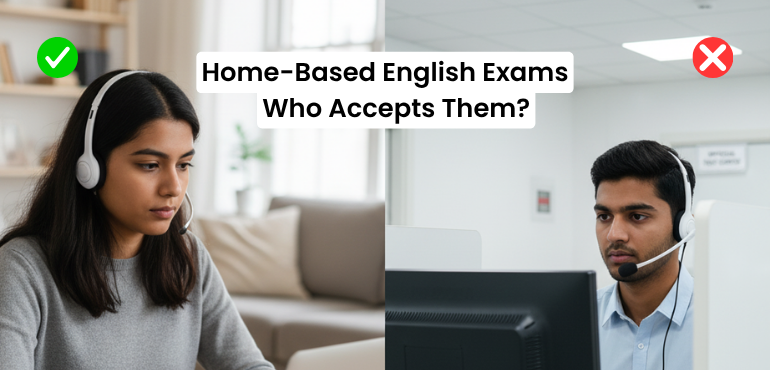
Over the last few years, remote English language exams such as TOEFL iBT Home Edition, IELTS Online, and the Duolingo English Test (DET) have made it easier for students worldwide to prove their English proficiency without visiting a test centre. As the convenience of home testing grows, so does the confusion about which countries actually accept these remote-proctored exams for master’s admissions and student visas.
As of October 2025, countries fall into two categories: those open to at-home testing, such as the United States and the United Kingdom, and those locked down and rejecting it, such as Australia, New Zealand, and Germany.
Countries Accepting Home-Based English Exams
United States
The USA continues to lead in flexibility. Almost every major university accepts TOEFL iBT Home Edition and the Duolingo English Test (DET). Over 3,000 American universities recognize these online tests, including top institutions such as MIT, Stanford, and Yale.
Admissions policies — not federal immigration rules — determine acceptance. If a U.S. university recognizes your home-based test, it is valid for your F-1 student visa too. This makes the U.S. one of the most student-friendly destinations for remote test-takers.
United Kingdom
The UK shows similar openness. Universities — including several Russell Group institutions — widely accept Duolingo English Test and TOEFL Home Edition scores for master’s entry.
Universities in the UK have the discretion to determine which English language tests they accept, provided they meet the admission requirements. It also means that the online versions are legitimate for Student Route Visa applications when the institution approves them.
Ireland and Canada (Partial Acceptance)
Ireland officially accepts the Duolingo English Test and TOEFL iBT Home Edition for most public universities.
Canada also allows these tests for university admissions; however, for visa applications under the Student Direct Stream (SDS), only IELTS scores from physical test centres are accepted.
In short — at-home test results may work for admission but not for visa purposes.
Countries Rejecting Home-Based English Exams
Australia
Australia has taken a strict stance against remote-proctored English exams.
The Department of Home Affairs clearly states that remote or at-home English tests are not accepted for any visa — including student (subclass 500) and graduate (subclass 485) visas.
All results must come from secure in-person testing centres such as IELTS, PTE, OET, or TOEFL iBT (centre version only). This is part of the government’s effort to maintain security and identity verification in testing.
New Zealand
New Zealand follows the same approach as Australia. Its immigration authority recognizes only English tests taken under official supervision at test centres. Home-based or online certificates are not valid for student visas as of 2025, reinforcing the focus on fairness and anti-fraud concerns.
Germany
Many German universities now accept the Duolingo English Test and TOEFL iBT Home Edition for master’s admissions. However, German consulates require student visa applicants to submit scores only from exams taken at a physical test centre, such as IELTS, centre-based TOEFL, or TestDaF. Admission and visa rules may differ, so students should verify both before applying.
Why This Divide Exists
The divide stems from differences in policy philosophy.
Countries like the USA and UK emphasize accessibility and university autonomy, letting institutions decide which tests they trust.
Australia and New Zealand, like Germany, support standardization and anti-fraud controls, even if candidates must take the test in a brick-and-mortar testing center.
As remote proctoring goes mainstream, this contrast highlights an age-old debate — is security more important than accessibility? Now, students will need to verify university and visa requirements before scheduling an exam.














